| Srl | Item |
| 1 |
ID:
119450
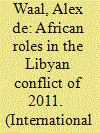

|
|
|
|
|
| Publication |
2013.
|
| Summary/Abstract |
Libya's relationship with sub-Saharan Africa has been complex, troubled and misunderstood, both during the rule of the late Libyan leader Muammar Gaddafi and the conflict that culminated in his overthrow and death. The Libyan conflict of 2011 divided Africa, but nonetheless the African Union (AU) was able to agree on a political strategy aimed at achieving a negotiated settlement and power transition.
The AU's peace initiative was launched in March 2011 and, contrary to widespread perception that the AU sought to prop up Gaddafi, it offered a credible and balanced option of a negotiated solution. United Nations Security Council resolution 1973 expressed support for the initiative, but in the event France, Britain and the United States blocked its chances of success.
This article draws on evidence and analysis provided by the AU officials involved. It details the process whereby the AU adopted and implemented its decisions, and describes the AU's diplomatic engagement with Gaddafi and the National Transitional Council. The article also draws on information provided by Sudanese military and intelligence officials, providing an account, hitherto untold, of how the Sudanese government supported the Libyan opposition with military supplies, training and intelligence, in tacit cooperation with NATO countries.
The article concludes with reflections on how the Libyan conflict has had an impact on the doctrine of the 'responsibility to protect', on the AU, and on Libya's relations with Africa.
|
|
|
|
|
|
|
|
|
|
|
|
|
|
|
|
| 2 |
ID:
119641
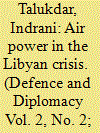

|
|
|
|
|
| Publication |
2013.
|
| Summary/Abstract |
Looking at the past century, it is possible to identify two eras of distinct international relationships between states: (1) the bipolar system (during the cold war); and (2) the unipolar or multipolar system (at present). This change of the international order has also produced a change in the way the use of force is seen in solving economic, ideological, or ethnic problems. The vacuume created with the dissolution of one of the two superpowers (USSR)-a vacuum not covered by the remaining superpower-has de facto opened the way to the proliferation of small wars. But even if small wars do not represent an immediate threat for most Western countries, prolonged small wars can jeopardise the international order. Apart from wars in the conventional and traditional way, unconventional warfare like civil war, ethnicwar, religious war, guerrilla warfare, terrorism, etc within a state also has the equal potential to endanger the international security. The Libyan crisis which saw the end of a dictatorial regime had such potential.
|
|
|
|
|
|
|
|
|
|
|
|
|
|
|
|
| 3 |
ID:
111718
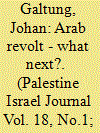

|
|
|
|
|
| Publication |
2012.
|
| Summary/Abstract |
It changes character, like in quantum mechanics, even as we watch. The French revolution did that in the late 1780s and early 1790s. But spring is gone, and revolt is in, so far not revolution. There are layers of rulers and layers of opposition. The unveiling has started.
If winter seeds from a suicide in Tunisia made buds sprout in early spring, then they must have fallen on fertile soil. Events make processes when "stability" is unstable, like the huge power and wealth gaps. The U.S. trick is to make people believe in individual mobility: "If you don't make it, it is your fault." Others see it as a relation: By taking power-wealth from us they got powerful-rich and we powerless and poor. The former is individualist and person-oriented; the latter collectivist and system-oriented. See it that way and revolts follow, like Tahrir Square, like Wall Street. But some resources are needed.
|
|
|
|
|
|
|
|
|
|
|
|
|
|
|
|
| 4 |
ID:
112958
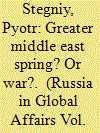

|
|
|
|
|
| Publication |
2012.
|
| Summary/Abstract |
The tight knot of contradictions surrounding the Iranian nuclear program and Tehran's policy in general has affected so profound international policies that any attempt to cut it may blow up peace already in the short term, and not only in the Greater Middle East.
|
|
|
|
|
|
|
|
|
|
|
|
|
|
|
|
| 5 |
ID:
114216
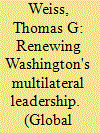

|
|
|
| 6 |
ID:
111730
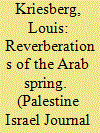

|
|
|
|
|
| Publication |
2012.
|
| Summary/Abstract |
Popular outbursts protesting objectionable conditions or policies and seeking to change them often move quickly from one location to another. The diffusion within a society where people share distressed circumstances and suddenly believe they can overcome them is more readily explained than is diffusion from one society to another. However, the processes for the spread of popular uprisings and the risks and challenges of such movements within and among societies have some similarities.
|
|
|
|
|
|
|
|
|
|
|
|
|
|
|
|
| 7 |
ID:
123241
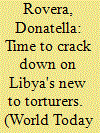

|
|
|
| 8 |
ID:
110139
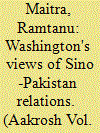

|
|
|